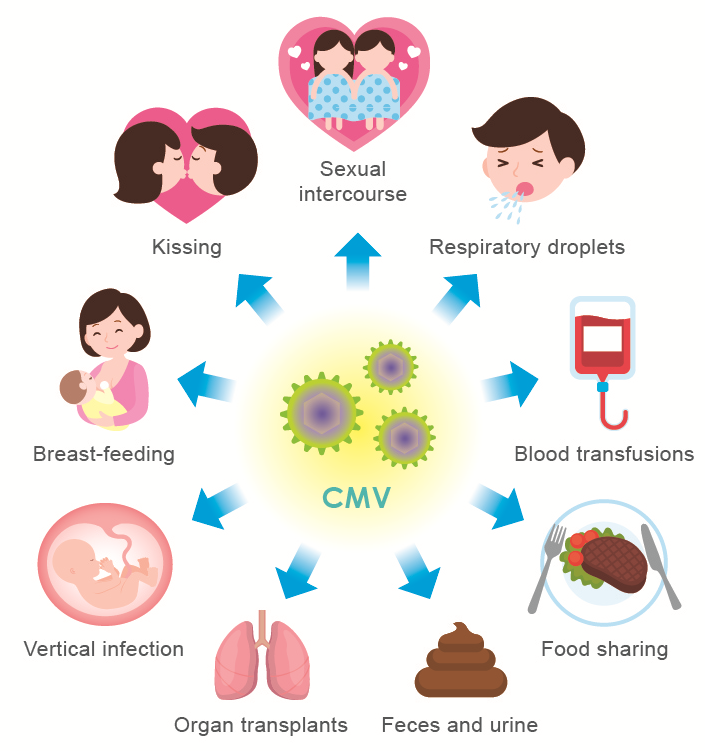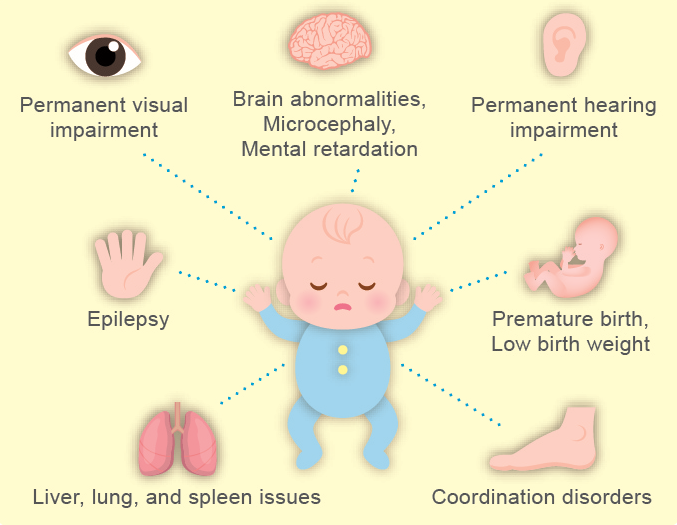Introduction
CMV infections are one the most common types of infections in Taiwan. The vast majority of infected individuals do not display any visible symptoms but become carriers for the rest of their lives and may transmit the virus to other people. In the event of lowered immunity (e.g. caused by factors including severe burns, major diseases, or organ transplants), the virus can be activated and lead to serious illness.
CMV poses an extreme threat to unborn babies. If the mother was infected with CMV prior to becoming pregnant, then they will likely have antibodies that can protect their babies. In this case, CMV is less of a problem, and most babies will be born normal and grow up healthy. However, if the mother contracts her first CMV infection during pregnancy, then she will not possess CMV antibodies. In this case, there is a chance of vertical infection, which can cause many serious problems for the baby, including death within several days or weeks. These symptoms may appear at birth or years later and gradually deteriorate.
Although the CMV carrier rate among individuals over 40 years of age in Taiwan has exceeded 70%, the CMV virus is similar to that of the common cold in that it comprises many different variants. Therefore, even if the expectant mother was infected by one variant of CMV before pregnancy, she may still contract a new strain during pregnancy, thereby increasing the risk that her newborn will also become infected with congenital CMV.
According to previous research, approximately 3,600 newborns in Taiwan contract congenital CMV infections every year, and 8% of congenital hearing loss is caused by this infection.
In the past, congenital CMV infections were widely believed to be incurable. Most babies that became infected before being born showed no symptoms. Newborns who did show symptoms were believed to be past the point of treatment; in other words, the damage had already been done.
In recent years, gradual hearing loss has been observed in babies who (1) were infected with CMV but (2) were otherwise healthy. These symptoms may worsen, which indicates that the virus is still harming the body. Currently, new drugs are being developed to provide additional treatment options. If a CMV infection is confirmed, symptoms can now be controlled with antiviral drugs under the guidance of specialists.
Indication
Suitable for:
Mothers who have not taken a CMV infection screening test before
Mothers who took a CMV infection screening test before they became pregnant or during their pregnancy and received negative results, but who may have come into contact with CMV since then
Mothers who were previously infected with CMV and are worried about vertically transmitting the virus to their babies
Mothers who are babysitters, kindergarten teachers, nursing personnel, or work in a field that puts them at greater risk of contracting a CMV infection
Description
The only way to distinguish congenital intrauterine infections from postnatal infections is to test the blood for viral DNA within two weeks of birth. After more than two weeks, it becomes difficult to differentiate between these types of infections. We suggest that congenital CMV infection screening be performed alongside routine tests that screen for congenital metabolic disorders so that the baby can receive extra protection without needing to undergo additional needle-related procedures.
SOFIVA GENOMICS uses the highly accurate polymerase chain reaction (PCR) assay, which only requires a small sample to provide complete test results quickly. This allows physicians and parents to obtain detailed information that can be referenced in future decisions related to medical treatment.
Patient Story
At birth, Sunny (pseudonym) had a clear and loud cry, was very healthy, and her newborn hearing tests came back normal. However, Sunny was diagnosed with severe hearing loss when she was two years old, and follow-up testing showed that her hearing continued to deteriorate. In the end, hearing aids were inadequate, and Sunny needed cochlear implants. Blood tests revealed that Sunny suffered from a congenital cytomegalovirus (CMV) infection. Had she been tested for the infection at birth and received the appropriate treatment early, Sunny could have retained more of her hearing.
How It Works
Step1:Discuss with your doctor and fill the consent form as well.
Step2:Take a few drops of blood from your baby’s heel after your baby is 24 hours old, but before your baby leaves the hospital.
Step3:The blood sample is sent to a newborn screening laboratory.
Step4:DNA will be extracted from the blood for screening.
Step5:The report will be given in 10 working days.

